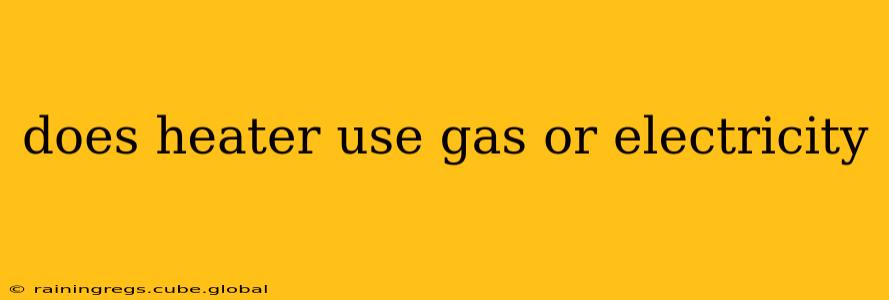Does a Heater Use Gas or Electricity? Understanding Your Heating Options
The simple answer is: it depends! Heaters can use either gas or electricity, or even other fuel sources like propane or oil. The type of heater you have, or are considering, dictates its fuel source. This guide will break down the different types and help you understand the pros and cons of each.
What Types of Heaters Use Gas?
Gas heaters are a popular choice for many homes due to their efficient heat output and often lower operating costs. Common types include:
- Forced-air furnaces: These are the most common type of gas heating system in many homes. They use a gas-fired burner to heat air, which is then circulated throughout the house via a network of ducts.
- Gas space heaters: These portable units are perfect for supplemental heating in smaller rooms or areas. They are often cheaper upfront than other options but can be more expensive to run long-term.
- Gas water heaters: While not directly heating your living space, they supply hot water for showers, baths, and laundry – contributing significantly to home comfort.
What Types of Heaters Use Electricity?
Electric heaters offer convenience and safety, often requiring less maintenance than their gas counterparts. Popular examples include:
- Electric baseboard heaters: These are common in older homes and apartments, providing consistent heat along baseboards. They are relatively inexpensive to install but can be less efficient than other options.
- Electric forced-air furnaces: Similar in function to gas forced-air furnaces, these use electric heating elements instead of a gas burner.
- Heat pumps: While technically using electricity, heat pumps are highly efficient because they move heat rather than generate it, making them a cost-effective choice in milder climates.
- Portable electric heaters: These offer flexibility and are ideal for supplemental heating in specific rooms. Options include fan heaters, radiant heaters, and oil-filled radiators.
What are the Differences in Cost Between Gas and Electric Heaters?
The cost of heating your home depends on several factors, including your climate, the size of your home, the efficiency of your heater, and the price of gas and electricity in your area. Generally:
- Gas is often cheaper per unit of heat produced: Natural gas prices fluctuate, but generally, it's a more cost-effective energy source for heating than electricity in many regions.
- Electricity is often easier to install and maintain: Electric heaters are generally easier and cheaper to install, requiring less complex infrastructure and potentially less maintenance.
Which is More Efficient: Gas or Electric?
Efficiency depends on various factors, but typically:
- Gas furnaces tend to be more efficient than electric resistance heaters. Gas furnaces have a higher AFUE (Annual Fuel Utilization Efficiency) rating. This means they waste less energy in the heating process.
- Heat pumps are often the most efficient option. They move heat rather than generate it, using significantly less energy.
What are the Pros and Cons of Each?
Gas Heaters:
Pros: Generally cheaper to operate (depending on location), high heat output, suitable for larger spaces. Cons: Requires gas line installation, potential for carbon monoxide leaks (requires proper ventilation and regular maintenance), higher initial installation costs.
Electric Heaters:
Pros: Easier installation, cleaner energy source, safer (no risk of gas leaks), lower maintenance. Cons: Can be more expensive to operate, may not be suitable for heating large spaces, reliance on electricity grid.
Ultimately, the best choice for you depends on your individual needs, budget, and local energy costs. Consulting with a qualified HVAC professional can help you determine the most efficient and cost-effective heating solution for your home.
